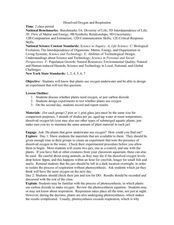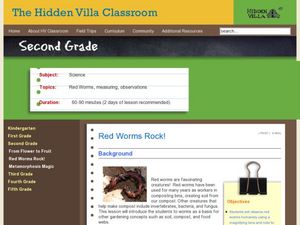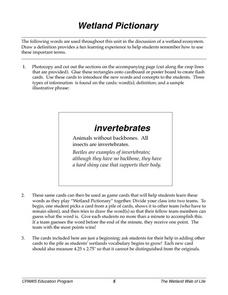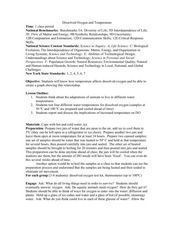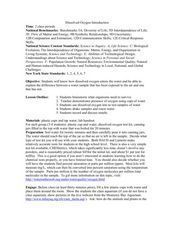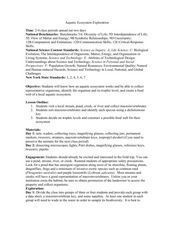Curated OER
Introduction to Macroinvertebrates
Third graders investigate the world of macroinvertebrates and identify the environmental stressors that threaten their existence. Outdoors, they role-play as stressors and invertebrates, with the intolerant species doing pushups, spins,...
Curated OER
What Is in the Water?
Students compare bottled water qualities to water found naturally in a pond habitat. They research their state's laws/regulations in regard to bottled water and study the advertising, cost, and quality of brands of bottled water. They...
Curated OER
Pond Ecology
A lab activity is a great way to incite thoughtful questioning and scientific processes. Pupils will collect organisms with a Petri dish, make observations, sketch the organism, ask questions, then attempt to identify the specimen...
Ocean Explorer
Architects of the Coral Reef
Coral Reefs are the focus of a life science lesson plan. Upper graders look at how coral reefs are formed, how the animals and plants reproduce, and the variety of ways that humans benefit from coral reefs around the world. Groups of...
Curated OER
Design a Reef!
Using a miniature coral reef aquarium kit, young ecologists model this unique ecosystem. They research various coral reef organisms and their niches, and they culminate the project by working together to write a report. Use this activity...
Curated OER
Species and Specimens: Exploring Local Biodiversity
Students practice skills essential to all scientific investigation: carefully observing and collecting data. They become field biologists in a series of hands-on activities to collect and identify specimens, and survey and calculate the...
Curated OER
Dissolved Oxygen and Respiration
Young scholars are presented with the question, "Do plants that grow underwater use oxygen?" They create an experiment to test the presence of dissolved oxygen in the water using provided materials. Student experiments include a control...
Curated OER
Change Since 1609
Learners recognize how the climate of the Hudson Valley has changed since the last glaciation. They explain these changes using a reconstruction of the land use changes in the Hudson Valley composed of confetti, Ziploc bags and other...
Curated OER
Red Worms Rock!
Second graders measure red worms. In this lesson, 2nd graders observe and collect data on red worms. Students measure the red worms and create a graph with the data they collect.
Curated OER
Plankton in the Air
Here is a lab activity adequate for use with any full lesson on environmental factors that shape animal adaptations or marine animal characteristics. Pupils will discuss the role plankton plays in the environment and filter-feeding...
California Academy of Science
Notice and Wonder
Pint-sized zoologists practice the art of observation. They take notes, pictures or written, as they observe an animal for a period of time. This can be done at the zoo, with a visiting classroom animal, or perhaps at the humane society....
Curated OER
Insects?
Can you tell the difference between a bug and an insect? Aren't they the exact same thing? Let your learners explore, identify, classify, and document the differences they see in bugs and insects. The activity sheet suggests several...
South Gloucestershire Council
Animal Classification: A Collaborative Sorting Activity for Key Stages 2 & 3
Introduce the logic behind a dichotomous key or administer a group performance assessment with a fun and challenging classification lesson. With explicit instructions for the teacher and for collaborative groups, as well as engaging...
Curated OER
Clam Anatomy
Students are introduced to the anatomy of the inside and outside of a clam before dissecting the animal. During the dissection, they label and identify the function of each part they see including the outside of the clam. They complete...
Curated OER
Wetland Pictionary
Students create a game for reviewing vocabulary. They make cards with definitions of the words. Then the cards are used to play the game of Pictionary or a modified game. The teacher could have the students generate their own game in...
Curated OER
Week 8 - Sea Life
Using a magnifier, mini marine biologists examine the barbules of a bird feather. They swirl the it into a mixture of oil and water and then re-examine the feather. After the activity, discuss how the oily feathers pose a problem to sea...
Curated OER
De"compost"ition
Students develop an understanding of the decomposition process and the parameters which influence the rate at which it occurs.
Curated OER
Wetlands Field Trip
Seventh graders used aquatic nets and other equipment to sample organisms in the lake -made plaster casts of footprints found around the edges of the lake -used reference materials to identify all organisms collected -filled out an...
Michigan Sea Grant
What's in This Water?
Pupils investigate the biological and chemical characteristics of water to determine where purple loosestrife occurs. They create data sheets to record water quality tests in several locations and work in groups to conduct the water...
Curated OER
Dissolved Oxygen and Temperature
Young scholars are shown how temperature affects dissolved oxygen and they create a graph showing this relationship. They think about the adaptations of animals to live in different water temperatures. Students test four different water...
Curated OER
Dissolved Oxygen Introduction
Students are shown how dissolved oxygen enters the water. They are taught the difference between a water sample that has been exposed to the air and one that has not. Students brainstorm what organisms need to survive. They use dissolved...
Curated OER
Is Our Water Healthy?
Learners test water for a least one chemical characteristic. They hypothesize how a storm event might change the chemical characteristics of a stream. Students collect water samples and use the chemical test to test the water.
Curated OER
Zebra Mussel Population Simulation
Young scholars are taught how to format and enter data into an Excel spreadsheet. They make a graph, and interpret graphed data. Students discuss the possible impacts of zebra mussels on the Hudson river. They graph zebra mussel data.
Curated OER
Aquatic Ecosystem Exploration
Students visit a local stream, pond, creek, or river and collect macroinvertebrates. They sort macroinvertebrates and identify each species using a dichotomous key. Students decide on trophic levels and construct a possible food web for...
Other popular searches
- Invertebrates and Vertebrates
- Marine Invertebrates
- Invertebrates Vertebrates
- Vertebrates an Invertebrates
- Vertebrate and Invertebrates
- Benthic Invertebrates
- Invertebrates Research
- Invertebrates + Vertebrates
- Macro Invertebrates
- Estuary Invertebrates
- Macro Invertebrates
- Bentham Invertebrates








